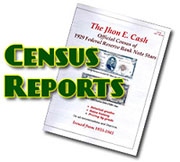









|
  
               
Need to contact us quickly? Send us an email by Clicking Here.
Click Here to view all of the currency that we've sold since the website was launched in January 2010.
If you want to chat with other collectors and dealers, visit the Collectors Universe Currency Forum The Bureau of Engraving and Printing's (BEP) takes you to the official government site of the BEP for some interesting information and facts on all of our US currency. US Papermoney will take you to a site that is full of information on everything you ever wanted to know about our US currency. Almost everything anyway. Very cool site! The American Numismatics Association (ANA) is a professional organization for those who want to further learn about US coins and currency. PMG and PCGS are the only two TRUE independent currency-grading services available. I highly recommend these two companies for those of you who want to get their currency certified and graded for insurance purposes or simply, a peace of mind. |
|
|
Homepage - Currency Home - Coins Home - Your Account - Shopping Cart - Research - Show Reports & Blogs - Currency Census - Site Map
 |
 |
 |
 |
|
Visits Since March 15th 2010:
There are currently visitors browsing www.jhonecash.com.
View Site Statistics






















